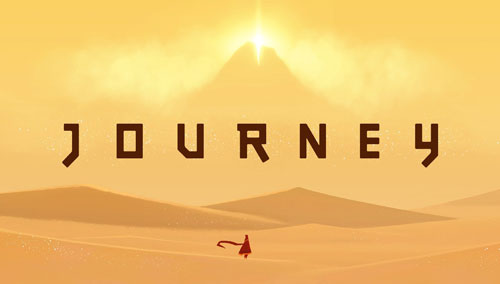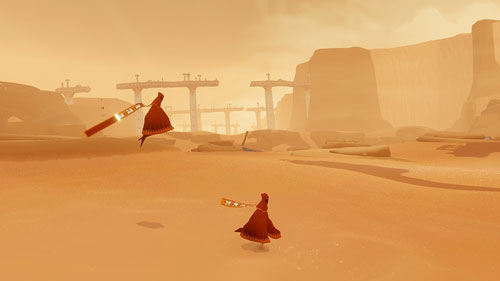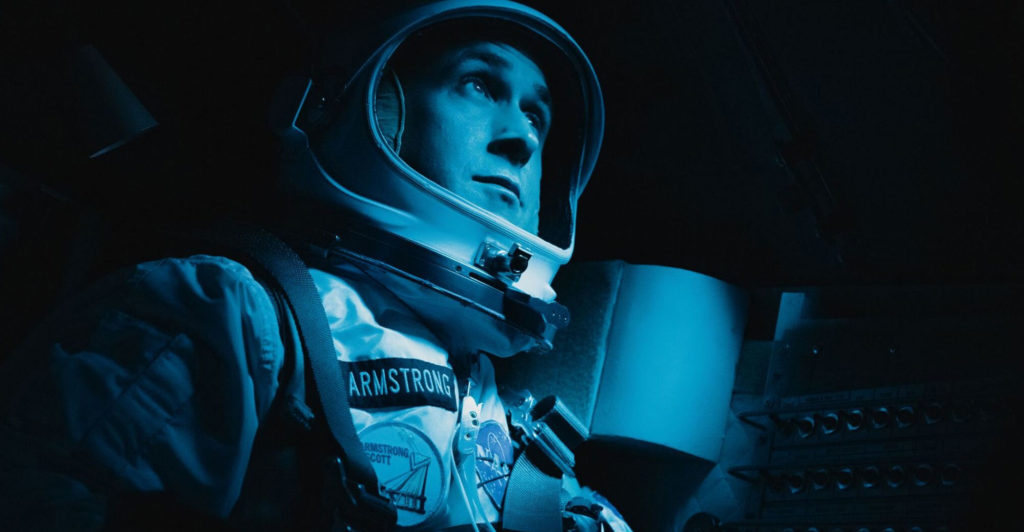
Journey lasts just two to three hours, but it will turn out to be one of the most memorable gaming adventures you will experience this year. The new PlayStation 3 exclusive from thatgamecompany (TGC) is an enigmatic parable and a meditative mood poem in video-game form — a game that taps into parts of the human experience left untouched by most other video games.
Just like TGC’s previous game, Flower, Journey takes you on an abstract emotional journey that also serves as an allegory for … something. At the outset of Journey, your hooded human avatar wakes up in a desert with no clues about what to do except for a light shining on a distant mountain. Instinctively, you’ll find yourself following the light, pushing your way through the sand and against the wind.
The gameplay mechanics are simple: use the analogue stick to keep moving forward, press the circle button to call the floating pieces of cloth that help you to jump and float, and press and hold “X” to leap and drift on the currents of the wind. There are no scores, ways to die or weapons to use on enemies. Puzzles and platforms are irrelevant. There is just you, making your way through the game world, trying to reach the top of that mountain.
Journey features some of the most beautiful and subtle art and audio design you’re likely to find in a video game, creating a world that evokes the wonder and terror of nature. As you make your way through the game, you’ll push your way through sand and snow that feel wonderfully tactile, stop to listen when you realise that the only sound is the wind howling around your ears. Later, as more intense emotions come into play, the score swells into dramatic crescendos.

Perhaps the single most innovative gameplay element in Journey is the jerk-proof way that it handles cooperative online play. Like Demon’s Souls and Dark Souls — the role-playing games from From Software — Journey strips away voice chat and other basic multiplayer features to create an online mode that keeps you immersed in the game world even when you are playing with another human.
As you inch your way towards the summit of the mountain, you will randomly encounter other pilgrims in the landscape. You will not see the gamer tags of other players you have met until the final credits of the game are rolling. Your only way of communicating is through a discrete chiming sound to attract the other player’s attention.
Some players I encountered on my journey pointed me to the solution to a puzzle before dashing off to the horizon, no doubt to help some other lost soul. Others busily brushed past me on their way to their goal, a few seemed to look to me for guidance and one spent ages with me seeking out secret areas.
Journey trailer (via YouTube):
Each encounter is wordless, but company is always welcome in Journey’s vast and isolated world. What an elegant way to create a quiet and shared experience in a world where noisy chatter seems to have invaded every aspect of our lives. It’s only at the end that you learn that ScrotumBoy82, who probably spends his time online swearing at Call of Duty noobs, may have been the Good Samaritan that helped you out when you were lost in the desert.
There is no score for Journey because a mark out of 10 seems utterly meaningless for a title that throws the usual terms of engagement out the window. Puzzles and gameplay mechanics melt away within minutes of starting Journey, allowing you to focus on what the game means and how it makes you feel.
Film critic Roger Ebert may be right that games will never qualify as art, but Journey comes as close as any game I have ever experienced. — Lance Harris, TechCentral
- Journey can be downloaded from the PlayStation Store for R125
- Subscribe to our free daily newsletter
- Follow us on Twitter or on Google+ or on Facebook
- Visit our sister website, SportsCentral (still in beta)




